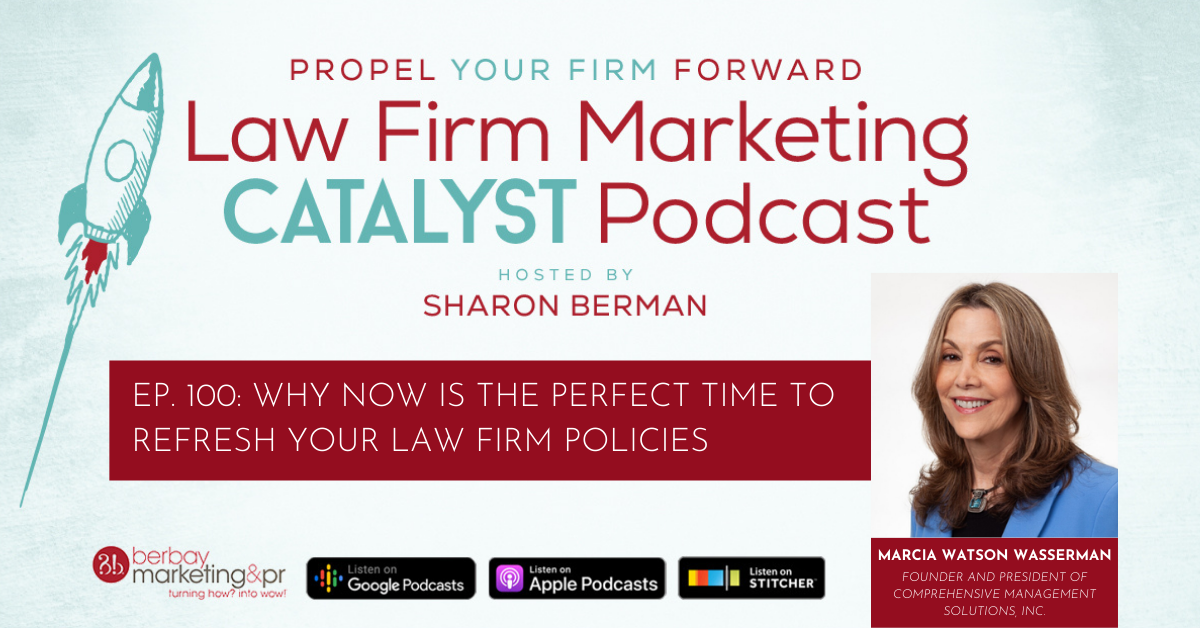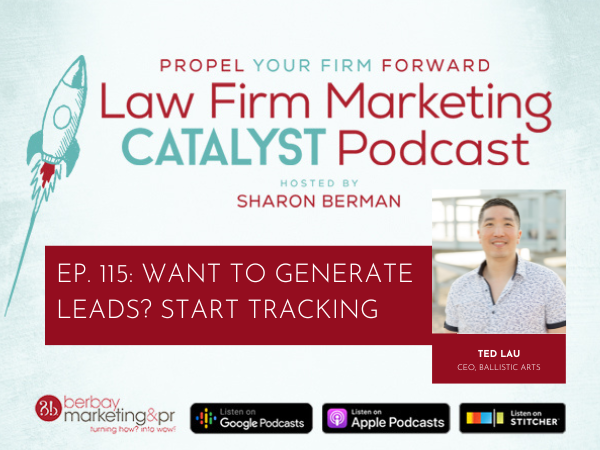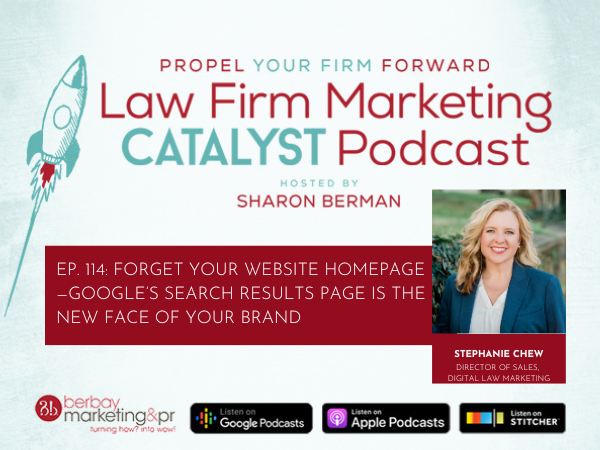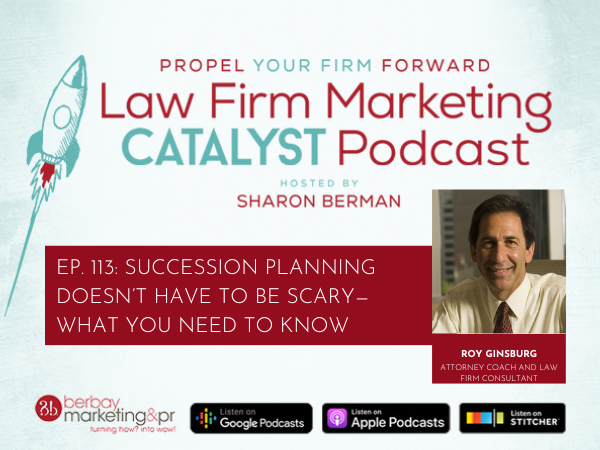Episode 100
What you’ll learn in this episode:
- What law firm culture is, and why it affects clients as much as it affects staff
- Why law firms should look at their policies with fresh eyes post-pandemic
- How firms can use technology to enhance communication
- When it makes sense for firms to use a hybrid work model, offer hoteling, or open smaller satellite offices
- How to maintain firm culture when staff is remote
About Marcia Watson Wasserman
Marcia Watson Wasserman is a published author and co-author of the books: Law Office Policy, Procedures, and Operations Manual – Seventh Edition (ABA 2022), and Lawyers as Managers: How to Be a Champion for Your Firm and Employees (ABA 2017). She is a Fellow in the College of Law Practice Management, one of an elite number of consultants who have earned this honor. Marcia serves as Columns Editor on Law Practice magazine’s editorial board and is a member of the Publishing Board of the ABA’s Law Practice Division. Additionally, Marcia frequently presents law practice management topics for legal and business conferences while also contributing articles on law practice management to leading legal publications.
Prior to founding Comprehensive Management Solutions, Inc. in Los Angeles, Marcia served for over 15 years as Chief Operating Officer and Executive Director for several national and local law firms, including an AmLaw 200 firm. Earlier in her career, she served as Director of Law Firm Services and Director of Client Advisory Services for two, mid-sized CPA firms in Southern California.
Additional Resources:
LinkedIn: https://www.linkedin.com/in/marciawwasserman/
Website: www.comprehensivemgmt.com
Law Office Policies, Procedures, and Operations Manual, Seventh Edition

Lawyers as Managers: How to Be a Champion for Your Firm and Employees

Law Firm Marketing Catalyst Podcast
After decades of incremental change, the pandemic forced many law firms to embrace technology, rethink work traditions, and evaluate their culture almost overnight. According to law practice management consultant Marcia Watson Wasserman, these changes have been a net positive, even though they’ve raised new questions about how to manage a law firm in the post-pandemic landscape. She joined the Law Firm Marketing Catalyst Podcast to talk about how firm culture trickles down to clients; what technology firms should be investing in; and how firms can embrace remote work. Read the episode transcript here.
Sharon: Welcome to the Law Firm Marketing Catalyst Podcast. Today, my guest is Marcia Watson Wasserman, Founder and President of Comprehensive Management Solutions. Her company provides COOs with to-go law practice management consulting and coaching services to boutique and midsize law firms and their managing partners. Marcia is also coauthor of several books on the subject of law firm management. Her most recent book, coauthored with consultant Cynthia Thomas, is the seventh edition of “Law Office Policy, Procedures, and Operations Manual,” published by the American Bar Association. Today, we’ll look at how efficient law office management facilitates good marketing. Marcia, welcome to the program.
Marcia: Thanks for having me, Sharon,
Sharon: So glad to have you. As I was saying, it’s such an accomplishment to have not only coauthored this book, but to have a list of books you’ve coauthored. Tell us about your career. You have an impressive track record in the area of law office management. Tell us about your career track.
Marcia: It all started accidentally when I was an undergrad at UCLA. When I was a sophomore, I saw a job on the job board. It was a part-time job working for an attorney. I took that job and learned how to be a legal secretary and a paralegal. I was the backup bookkeeper and office manager and eventually became Executive Director of several law firms back in the 1990s. I was also COO of an AmLaw 200 firm. I decided I wanted to be an entrepreneur and that consulting was far better suited to me, so that’s what I started doing, consulting to law firms. For the last 20 years, I’ve led a managing partners roundtable of boutique and midsize law firms and enjoy doing that, too.
Sharon: I remember when you started it. That’s how long we’ve known each other. Even before that, but I do remember when you were starting that.
Tell me about law firm culture. How does that affect employee satisfaction, and how does employee satisfaction affect or facilitate good marketing?
Marcia: I want to quote a law firm futurist, Jordan Furlong, because he says it so well. Culture is what people at the firm actually do every day. In harsher terms, it’s what people get away with. Culture is what actually happens. So, what type of culture you have has an impact on who you hire, whether people are happy, whether they stay with you and how you communicate with clients. If you don’t have motivated employees, your clients are not going to be happy with you. If you have people phoning it in and not really dedicated to serving clients, it’s going to have a huge impact on your clients.
If you have a great positive culture, then you not only have good employees, but you have clients who are drawn to you as well. You become known for your brand and people seek you out because it’s an important part of your own attempts at business development and marketing. If you have a good culture, it gets known. Suddenly, you’re on the best law firm list for employees and your client base expands.
Sharon: Is that the way law firms should review and assess their current policies? Especially post-pandemic, when everybody’s ramping up again, how should law firms assess their policies and procedures?
Marcia: They need to look at them with fresh eyes. You may have done something for many years because it made sense, but after the pandemic, when law firms discovered we could work virtually—least most positions could—you need to look at every single thing you do with fresh eyes. There were certain things that were temporary, governmental regulations that you had to put in place because of the pandemic, like mask wearing and cleaning and not allowing clients to come to our offices. Now a hybrid workplace is the new normal. We’ll see how that plays out over time, but people reevaluated what they wanted, which has an impact on culture and has an impact on clients.
It isn’t just the firm that has that in mind; it’s the clients as well. Clients don’t necessarily want to get in the car for an hour and drive to you. I heard family lawyers and estate planning lawyers say, “Oh no, it will never work. They’re used to coming in. It’s a very close relationship, and they want to come to the office. We have to have these really nice, big offices for them.” The reality is that’s not what the clients necessarily want. The clients can do a Zoom or a Facetime or whatever works for them, and they’re very happy to have a relationship with you that way. There may be a time and place where they do want to meet with you in person, but not necessarily as much as lawyers would have assumed they would. So, you have to have policies in place that take all of those things into account.
Demand has changed as to what clients’ expectations are. Some of it has to do with the age of your clients. A lot of this is generationally driven, namely the younger lawyers and staff and clients who are Gen Z or Millennials, who have a very unique spin on what work and work/life balance means. If they’re a client, they want to work with a law firm that understands that, so you’d better be marketing appropriately to your clients, know who your clients are and have the right people there. A Gen Z client or even a Millennial will not necessarily want a near-retirement Baby Boomer as their attorney, so you’ve got to pay attention to relationships.
There are certain policies you have to have that are formal, like leaves of absence and antidiscrimination, but if you’re looking forward, what do you want your firm to look like? Make those policies to take into account a hybrid workplace. Be culturally and otherwise diverse and have fun things in your policies, too. Have a fun committee, whether it’s virtual fun or nonvirtual fun. It makes a difference.
Sharon: I know a lot of companies learned how to use technology because they were forced to learn how to use technology, whether it’s a law firm or a different kind of business. They said, “This will never work with virtual or a hybrid law firm.” What kind of technology have firms been implementing? How are they going to be doing this differently? What have they learned during the pandemic, and how are they going to be operating differently in terms of technology?
Marcia: There’s so much available with technology. Even the Zoom we’re doing today, if the pandemic had happened 10 years ago, we wouldn’t have had a good medium like this to communicate. Communication is so important, and technology is right there with us, leapfrogging ahead of what the law firms were expecting. I know of immigration law firms and certain plaintiffs’ firms that are using chat boxes and fillable forms. That’s how they do their prescreening; they’ve designed their software to prescreen potential new clients. It makes it a little more seamless for the client. They can go on to somebody’s website and fill out a form, so they don’t waste time waiting for somebody to call them back. They’re able to immediately get that information to the firm. Somebody reviews it and gets back to them much more rapidly at the intake stage.
There are document management systems that some firms were lazy about; they didn’t want to make the investment. If you have those systems in place, you can share documents with clients much more easily. When you’re setting up workflow and processes, usually firms look at it totally from an internal viewpoint of what’s easy for them. They need to be outward-facing and think, “How will this work for our clients? How can we be more efficient so that our fees are fair, we can get things done faster for our clients and we can share documents with our clients?” Even if you’ve got a brainstorming session with a client on Zoom, you can use a whiteboard on Zoom or whatever other software you’re using. You’re able to communicate that way and use technology to enhance communication that you wouldn’t otherwise have.
Sharon: That’s an interesting point about the fact that if the pandemic had happened pre-Zoom, I wonder if it would have lasted as long. Everybody would have pushed to be able to get back into the office. It’s an interesting question. I saw some ads recently for law firm marketers. They talked about the fact that it was a hybrid environment and I thought, “If you had suggested that 10 years ago, five years ago, the employers would have said, ‘Forget it! We’re not going to do it that way.’”
Marcia: There are still employers who are behaving that way. I know of law firms that said, “We’re important because we’re employment lawyers and our clients really need us; hence, everyone needs to come back to the office one month into the pandemic. We’ll spread people out and do our best to do what we can do, but everybody needs to be back in the office. My legal secretary has to be outside my door to do the things I need. It can’t be done remotely.” The firms that took that position lost a lot of their lawyers and staff who said, “No, it’s not safe, and that’s not what I want to do.”
Sharon: In terms of lawyers working remotely or in hybrid environments, is that going to remain, especially with younger lawyers? Have they seen the way it might be and said, “I’m not going back to what it was”? What do you think?
Marcia: Some of it depends on where you live. In a congested area like Los Angeles, where both of us live, yes, hybrid will happen because people realize, “Wow, I don’t have to be in a car two or three hours a day commuting. I’m so much more productive. I can get more work done. I can be with my kids. I can have more of a balanced life.” The younger lawyers are driving that and demanding it and saying, “As long as I’m getting the work done, what does it matter?”
Now, when hybrid comes in, there’s a time and place where getting together makes sense. If you’re onboarding new people, you can do it virtually; there are best practices for doing it, but there’s a lot to be said for a brand-new person to come in and actually meet people and get walked through things. There’s a time and a place for a team meeting. If there’s a group of people that work together on a particular client and an important event is coming up, a trial or whatever, it makes sense for them to be in the office the same day. Even though a lot of clients say, “We don’t need to come in,” there may be a client that wants to come into the office, and that’s also the time the team should be there.
But I’m seeing a lot more willingness to let people adjust their schedules, and everybody’s a lot happier. It depends. Your older lawyers who are accustomed to coming to the office all the time swear they can’t work at home; they just can’t do it, so they’ve been going into the office throughout the pandemic. There are younger lawyers, too, who say, “I have roommates; I have a one-bedroom; I can’t work and live in the same place. I don’t have enough space. I can concentrate better in the office,” and they’ve been going to the office the entire time. The great majority of them say, “Hey, I want some balance in my life. This is really working, and as long as I get the work done, give me the autonomy and the authority to get it done my way, as long as I’m meeting deadlines.” A lot of that has to do with how well your communication systems are in place. I do hear that people are worried about losing their culture because everybody’s operating more in a silo. So, you have to work at that.
Sharon: How do firms have to operate differently? You mentioned communication. How about telecommunication? Do law firms have to strengthen or change their management policies around that communication? You have to work harder, I presume, to keep a culture.
Marcia: You do, and that’s why firms are having things like happiness committees where they come up with events, virtual or otherwise. There are firms I know that have done walks on the beach during the pandemic just to keep people engaged, or they had everyone met at a park and bring their own lunch and stay socially distanced just to see one another. I know a few firms that had retreats at remote locations during the pandemic. They had everyone take Covid tests and made sure they were O.K., and nobody got sick because they were very careful about what they were doing. A lot of it depends on what your culture was to begin with and how friendly an environment you were. Are you a new firm? Are you a firm that’s been institutionalized for 40, 60 years and you’re used to doing things one way and you don’t like change?
Lawyers don’t like change anyway, so you need to manage a little bit differently, and communication is an important part of that. Everyone likes to be communicated with in a different way. Some people are happy to text one another and use Slack, and other people want to use video more. Every circumstance requires a different situation for communicating, both as to what the individuals’ preferences are and the circumstances of what you’re communicating about. People shouldn’t just endlessly do Zooms. Everybody is burned out on Zoom. Meetings should be intentional. They should have agendas. There’s a time and place for people to meet in person, and a time and place to have a group Zoom meeting or a one-on-one.
Sharon: I like the idea of the fun committees and walks on the beach. Those are great ideas in terms of keeping something cohesive during the time when you’re supposed to be spread apart.
I’ve read about law firms opening more branch offices, little satellite offices of one or two people. Is that happening, or is that an exception? What’s the scoop on that?
Marcia: I’d say, again, it depends where you live. If you’re in a small town where everything is close by in Middle America, you don’t need it. But in suburban areas that are spread out, yes, I’m definitely seeing it for a variety of reasons. One is to serve clients. It’s to open an office closer to where your major clients live so they don’t have a big commute to come see you. That’s one reason. One firm I know, the senior partners live in the suburbs and they don’t want to drive to the home office all the time, so they opened a branch near where they live to make it convenient. Now they don’t have to come to the main office all the time.
Another firm I’m aware of—and this happened a lot—when people were working virtually, many of the employees, staff and the lawyers decided they were going to move because they wanted more space. They moved farther away, in some cases another county away. We have L.A. lawyers who’ve moved to Orange County and San Diego County. We have lawyers from the west side who had a small apartment and said, “No, I want something bigger for my family.” They bought a house out in the suburbs, an hour and a half drive from their office. Suddenly the firms are finding out about it later, after the fact, and saying, “O.K., what can we do to keep these people?” One firm I know has downsized their main office in L.A. and built a big branch because so many of their people moved into the area where they’ve opened the branch. The branch office is probably as large as the main office now. They did it to accommodate people’s lifestyle and commute and to make sure their employees were happy.
Sharon: Are you seeing established law firm offices in Century City or downtown shrinking their spaces?
Marcia: Absolutely. They’re doing more hoteling. It depends where they are in their lease. If their lease came up during the pandemic, almost universally they’ve reduced their space. If they still had time to go, they put up with it or renegotiated with their landlords to extend the term and make it less expensive, or they gave up some of their space. A lot of people are subleasing space. I have a client that is looking to move into subleased space because their lease is up. Just in their own building, they’ve had offers from several different law firms to move into subleased space. These other law firms—that are well-established law firms—have too much space.
They’re doing a lot more hoteling for lawyers, just like CPA firms have done for a long time and commercial real estate brokers started doing a number of years ago. It was always, “Oh no, lawyers can’t do that.” Well, lawyers can do that. If you want to work at home three days a week and be in the office two days a week, if you don’t need your own dedicated office with your plaques on the wall, you can have an office or a conference room. There’s scheduling software that firms are buying that accommodates this. The receptionist has scheduling software so that when people come, it arranges an office for them, and they know where to go. That’s another place where technology is helping, so you don’t have three people showing up to share the same office on the same day.
Sharon: When you say these are things that other industries have been doing for a long time, I worked for a large accounting firm 25+ years ago and they were starting hoteling. I guess it takes a pandemic to get the world to move.
Tell us more about the book. I was looking at the information about the book on the jacket, and it looks like you can tear it apart, make your own templates and really use the book.
Marcia: The main part of the book is an employee handbook. It’s a multijurisdictional handbook because we weren’t writing it for California or New York. We have readers in the ABA who live in Canada and elsewhere in the world, so we tried to make it as general as possible, while reminding people that you’d better make sure what the laws are before you adopt a policy that won’t work where you are. We made that part of the book available online in Word format so you can take it if you don’t have an employee handbook. It covers all the legal things you have to have about antiharassment and overtime and those kinds of things, but it also covers how to deal with technology and cybersecurity. We reached out to SMEs to write some of the chapters for us.
Sharon: SMEs being?
Marcia: Subject matter experts. My coauthor and I certainly aren’t IT/technology/cybersecurity experts. That’s such an important area. We reached out to four individuals from two companies who actually wrote that chapter for us, which includes model cybersecurity guidelines and policies for law firms. You can just take that and put in your handbook.
That’s one part of the book, and the book has been around since 1982. The original book was written by a lawyer in L.A. named Bernie Ralston. Bernie was a mentor and a friend to me along the way. I met him through Bar Association volunteerism over the years, and he would refer clients to me. Bernie is just about 100 years old, and he’s still licensed to practice law in California and does arbitrations. I don’t think he does a lot of work anymore; it’s probably pro bono. He was the one who came up with the idea of doing this book, and here we are at the seventh edition. It’s pretty special.
Sharon: Wow! The seventh edition must have a lot of changes from the last version in terms of how you deal with post-pandemic issues and how you deal with cybersecurity. That has become such a huge area.
Marcia, thank you so much for telling us about this. You’ve given us a lot of food for thought and ideas about where we can get answers, such as your book. The templates sound like a fabulous benefit for law firms. Once again, thank you very much. We greatly appreciate you being here today.
Marcia: Thank you, Sharon, for giving me the opportunity to speak with you.



